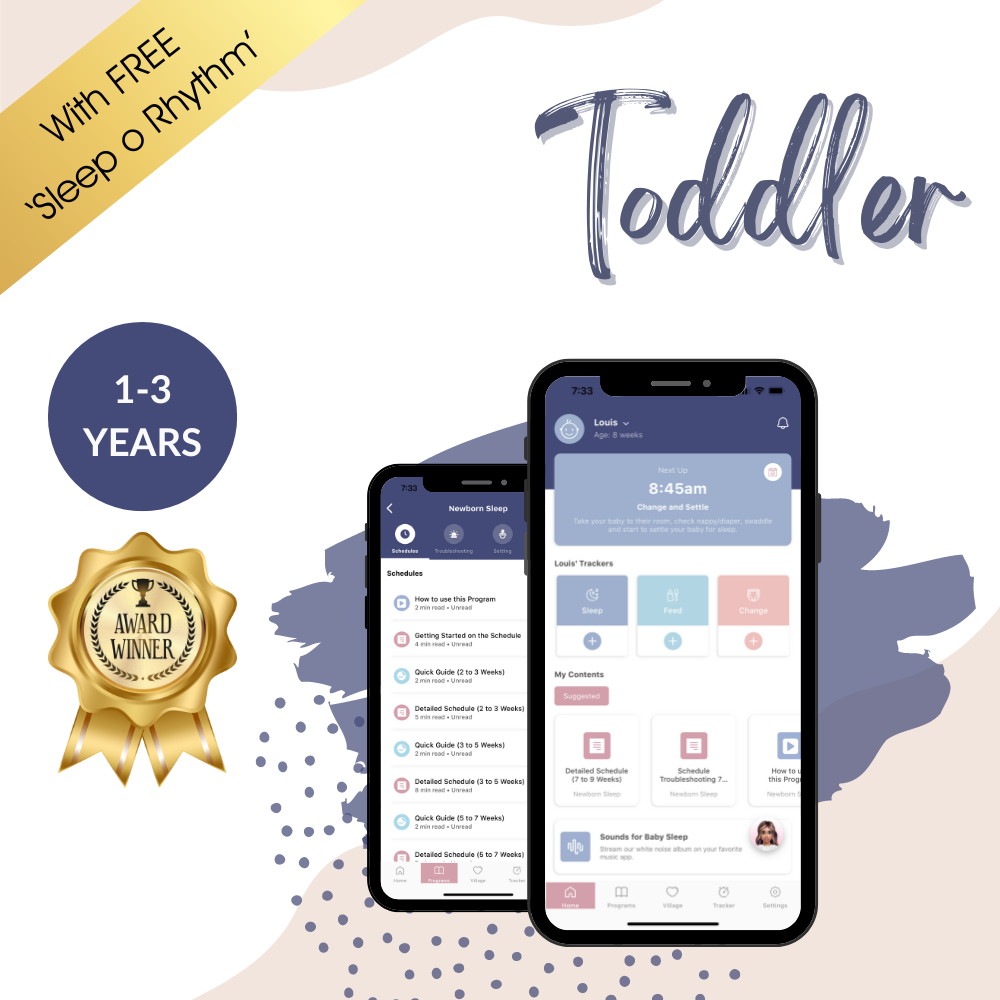
Newborn Sleep Guide: What to Expect in the First 12 Weeks


Welcome to parenthood! It's a pretty cool club, but there are a few things you ought to know about the newest member of your family...
Babies grow and change very rapidly in the first 12 weeks of their lives as they adapt to life in the outside world. Their sleep patterns and rhythms start to mature towards the end of this period and in these initial few months, you will see evidence of a lot of neurological development in your baby. Let's examine what is going on in your baby's world during this time:
In this article:
- Wake windows for newborn babies
- Over and under tiredness
- Napping
- Night sleep and waking
- Settling
- Sleep regressions
- Your baby's nursery
- Other factors affecting sleep
Need support figuring out your newborn's sleep?
Being a new parent can be overwhelming. You probably have lots of questions. Find the answers to all your questions and more in our Sleep Programs to future-proof your newborn's sleep.
Get our Sleep Programs
Wake Windows for Newborn Babies:
When your baby is brand new they will be very sleepy from their birth. For some babies, this will wear off in a few days, but for others it can take a few weeks. This can mean your baby seems to do nothing but feed and sleep all day! At this very young age, some babies can really only manage to stay awake for 1 hour at a time before they need to be settled back to sleep.
By the time your baby reaches 12 weeks old though, their wake windows will have gradually stretched out to 2 hours. Baby sleep is actually quite a delicate thing and babies are very sensitive to the balance of awake time and sleep throughout the day. If their awake times and nap lengths are not adjusting to suit your baby as they grow, you will likely find that your baby begins to resist settling, starts napping for short periods, wakes more frequently in the night or stays awake for long periods in the night.
Many people fall into the trap of thinking their 12 week old baby can still only stay awake for an hour at a time, when their baby's sleep needs, especially those wake windows, will have changed dramatically over the last 3 months. Our Baby Sleep App can help to take the guesswork out of your baby’s changing sleep needs, making it easier for you to know just how and when to extend your baby's wake windows and regulate their nap lengths.
Over & Under Tiredness:
Babies in this age bracket can get overtired really quickly and easily and then need a lot of help to switch off and settle to sleep. So naturally, a lot of parents will try to avoid this by settling their baby to sleep after just 1-1.5hrs awake time or as soon as their baby starts to show tired signs. However, overtiredness very regularly gets mistaken for its opposite: under tiredness (read this article for more information).
Once the newborn sleepiness wears off, your baby may start to exhibit quite unsettled behavior - crying more, being difficult to settle to sleep, catnapping or waking very frequently overnight. Many parents assume this unsettled behaviour is due to colic, reflux or overtiredness, when in actual fact, their baby is undertired, overtired or needing their daily schedule tweaked
Napping:
Sleep is as much a nutrient for babies as milk. It is often overlooked, even by some medical professionals, in terms of its absolute importance to a baby's growth and development. Up until the age of around 3 years, babies and toddlers need daytime naps. The amount of nap hours obviously changes during this time, however, in order to encourage good night sleep, efficient feeding and a happier baby, you need to work towards an appropriate amount of nap hours for your little one.
As an indication, a baby between the ages of 0-6 weeks should ideally be having between 5.5 - 4.5 daytime nap hours in total. From 6-12 weeks this amount will decrease further to between 4.5 - 4 hours. These dramatic changes in nap hours throughout the first 3 months happen as a result of your baby's neurological maturation and their ability to stay awake for longer periods between naps.
If your 12 week old baby is still having 4 or 5 hours total day sleep, they will likely start to wake a lot more in the night, resist settling at bedtime, stay awake for long periods (especially between 2-4am) or waking early in the morning.
Say goodbye to sleepless nights.
Join over 800,000 families worldwide who are enjoying excellent sleep with our Sleep Programs, created by experts in the field of pediatric sleep.
Get our Sleep Programs
If, on the other hand, your baby is not doing even close to these nap hours, they are at risk of becoming overtired. There may be several reasons why your baby is struggling with naps but the best place to start is by ruling out over or under tiredness with our Baby Sleep App. Once you can rule out over or under tiredness out of the equation, you'll be one giant step closer to working out what’s going on with your little one’s sleep.
Day & Night Confusion:
This is a common "condition" for newborn babies and there is a lot of folklore out there that suggests the key to resolving this issue is to have your baby nap in the light during the day, so that they learn to differentiate daytime from night.
However, prior to 8 weeks old, this won't actually make much difference to your baby's ability to regulate their napping and night time sleep. What causes this day/night confusion is actually an imbalance in your baby's very immature circadian rhythm. Their body clock hasn't set itself yet. This is why your baby may happily sleep for big stretches during the day, then wake a lot more frequently at night.
We obviously want to reverse this pattern so you and your baby can sleep those longer stretches during the night and so your baby isn't missing any of their feeds in the day. The best way to do this is to help your baby regulate their day sleep by taking a bit more control over how long they nap for - waking them from naps if needed to prevent too much sleep accumulating throughout the day (read this article for more information). Regulating your baby’s day sleep will help to consolidate their night time sleep so that they sort their days and nights out a lot quicker.
Night Sleep & Waking:
In the first 12 weeks your baby will wake in the night and need milk. Very few babies are able to “sleep through the night" without needing a feed at this age and prior to 6 months old, babies don't easily form wakes purely out of habit. There are also a number of other reasons, aside from hunger, that might cause your baby to wake more during the night, especially if their waking has increased or is very frequent (eg. every hour):
- they are not swaddled (swaddling calms the startle reflex which is a crucial element in your baby sleeping better in the day and at night)
- they are being woken by environmental or household noises (using white noise is the best way to combat this)
- they are too hot or cold
- they are uncomfortable (usually from trapped wind)
- they are sick
- they have a condition such as reflux
- they have had too much or too little day sleep (this is the most common reason)
Settling:
Young babies’ brains operate for sleep in a slightly different way to ours. They change very rapidly and by 4 months your little one's sleep will become a lot more like adult sleep with more mature sleep cycles. This period of change is commonly known as the 4 month sleep regression, when babies begin to fully wake between sleep cycles, every 35-45 minutes in the day and every 2 hours overnight.
Prior to this age, however, a baby will more easily drift between sleep cycles during their naps or night time sleep and the way you put your baby to sleep before 12 weeks won't have much impact on their ability to stay asleep (like it does once they are closer to 4 months). In the first 12 weeks, it's fine to settle your baby completely to sleep - don't worry about "spoiling" your baby during this time or focusing too much on "self-setting". That said, we would always recommend setting up good sleep habits from early on, as this can make navigating the 4 month sleep regression a lot smoother.
To do this you could:
- aim to have your baby sleep in their own bed for at least one nap a day, so they learn this is where they go to sleep
- settle your baby to sleep in their bed rather than on you or in your arms so they learn that their bed is where they fall asleep. See our video here on settling techniques for your baby.
- give your baby the chance to fall asleep on their own, once they're ready for sleep and drowsy, if you think they can
- give your baby positive sleep associations like a swaddle, dark room and white noise
Sleep Regressions
These will become very real things in the months and years to come! A sleep regression is a period where your little one's sleep and settling appears to get a lot worse, or, regress. These stages are usually accompanied by big periods of change, either neurological or physiological, during which time your baby's sleep takes a hit.
At 8 weeks old, or thereabouts, you might notice signs of a regression. Your baby may start resisting naps, or taking much shorter naps than they were previously. This "regression" is linked to their changing biology as they come out of the newborn phase. What has happened is that around 8 weeks old there is a shift in their hormonal balance - the hormones they had from birth have now worn off. One of these hormones is melatonin and is responsible for helping us fall asleep and stay asleep. More about how you can counteract the effects of this regression further on in the article.
Another hot spot is at 12 weeks old. Many people assume there is a 12 week sleep regression, as it is common for babies to significantly shift in their sleep patterns at this age. Rest assured, there isn't officially a 12 week sleep regression - all that happens at this age is your little one is now really settling into life outside the womb and their sleep rhythms have changed dramatically since they were newborn. If you are still aiming for very newborn sleep patterns with your baby (short wake windows, pretty long naps) - you will really notice the change at this age. To stay on top of it, make sure you're constantly tweaking your baby's daily schedule according to their age and sleep needs (our Baby Sleep App can help you there!).
Your Baby's Nursery:
The environment your baby sleeps in can have a big impact on their settling and sleep at this age. In the first few weeks your baby will likely be happy to sleep anywhere because they're still in that newborn sleepy stage. The very first thing that will help your baby settle better and sleep for longer periods is a good tight swaddle. Swaddling is the oldest settling trick in the book as it replicates the confined feeling of being in the womb, ensuring babies can't startle themselves awake with their moro reflex, which doesn't disappear until around 4 to 6 months.
Let's get your little one's sleep sorted ASAP!Our award-winning Sleep Programs will solve your baby's sleep challenges in no time.
Get our Sleep Programs
White noise is another key component in helping your baby to settle and sleep. In the womb your baby is used to noise as loud as a vacuum cleaner 24/7; the sound of your heartbeat, digestive system and your blood rushing all around them. White noise is extremely comforting to babies and helps them tune out and fall asleep. We recommend playing it louder than your baby's cries to calm them and as loud as a shower when sleeping. Use white noise for all your baby's naps and overnight too.
Your little one starts relying on their own melatonin to fall asleep around 8 weeks old. Melatonin is only produced and released in the dark, so sleeping your baby in a dark room is an excellent way to promote good sleep. Like all mammals, babies find the dark comforting - they aren't afraid of the dark as older children might be since babies are not capable of mature emotions like fear. Avoid the use of night lights as these will actually stimulate your baby more and will not help your baby switch off and sleep.
Other Factors Affecting Sleep:
In the first 12 weeks there are some other factors that can affect your baby's ability to go to sleep and stay asleep. For babies who have a more predictable sleep pattern to their day though, it is far easier to pick up when something is amiss.
Hunger is often an issue with young babies. A hungry baby will not settle or sleep. Whether you are breast or bottle feeding, there are factors that need to be considered if you feel your baby seems to be constantly hungry or unsettled, such as an undiagnosed lip, tongue-ties or reflux. If everything else is lined up for your baby to get them sleeping well, yet you suspect hunger is an issue, talk to your paediatrician about these possibilities.
Sickness can also affect a baby's sleep. Common colds can mean your baby is uncomfortable or in pain and you should follow your medical professional's advice here. Sometimes, more seriously, babies can suffer from ear or throat infections and show no outward symptoms (not even a fever) other than a disturbance to their sleep. In most countries, healthcare is free for infants so if you are really struggling with your baby’s sleep or settling, it always pays to err on the side of caution and have your baby checked by your GP.
At this young age, babies change very quickly and so do their sleep needs. Our Baby Sleep App changes with your baby, as their awake times increase and their nap hours regulate, to help ensure they are settling and sleeping well both day and night.
___________
Bibliography
Butler, B., Burdayron, R., Mazor Goder, G., Lewis, C., Vendette, M., Khoury, B., & Pennestri, M.-H. (2024). Association between infant sleep, cognitive, and psychomotor development: A systematic review. Sleep, 47(11), zsae174.
Frontiers in Neuroscience. (2025). Maturation of infant sleep during the first 6 months: A mini-scoping review. Frontiers in Neuroscience.
Yao, T., & Booth, V. (2025). External light schedules can induce nighttime sleep disruptions in young children. arXiv preprint.
Ball, H. L. (2025, April 13). Put your baby down to nap near a washing machine, expert says. The Guardian.
Ball, H. L. (2025, June 5). Help! When will my baby sleep through the night?. The Times.
New Study (2025). Bedtime and naptime routines for young infants: Associations with sleep outcomes. Journal of Pediatric Health.
Wikipedia contributors. (2025). Infant sleep. Wikipedia.
Wikipedia contributors. (2025). Safe to Sleep. Wikipedia.
Rybak, A., et al. (2017). Gastro-Esophageal Reflux in Children. International Journal of Molecular Sciences, 18(8), 1671.
Parmelee, A. H. Jr., et al. (1961). Sleep patterns of the newborn. The Journal of Pediatrics, 58(2), 241–250.
Goodlin-Jones, B. L., et al. (2001). Night waking, sleep-wake organization, and self-soothing in the first year of life. Journal of Developmental & Behavioral Pediatrics, 22(4), 226–233.
de Weerth, C., Zijl, R. H., & Buitelaar, J. K. (2003). Development of cortisol circadian rhythm in infancy. Early Human Development, 73(1–2), 39–52.
Gunnar, M. R., & Donzella, B. (2002). Social regulation of cortisol levels in early human development. Psychoneuroendocrinology, 27(1–2), 199–220.
Middlemiss, W., Granger, D. A., Goldberg, W. A., & Nathans, L. (2012). Asynchrony of mother-infant HPA axis activity during sleep transition. Early Human Development, 88(4), 227–232.
St James-Roberts, I., Roberts, M., Hovish, K., & Owen, C. (2015). Video evidence that infants resettle themselves after waking by 3 months. Journal of Developmental & Behavioral Pediatrics, 36(5), 324–329.

Receive product and services updates, promotional offers and other marketing communications based.





